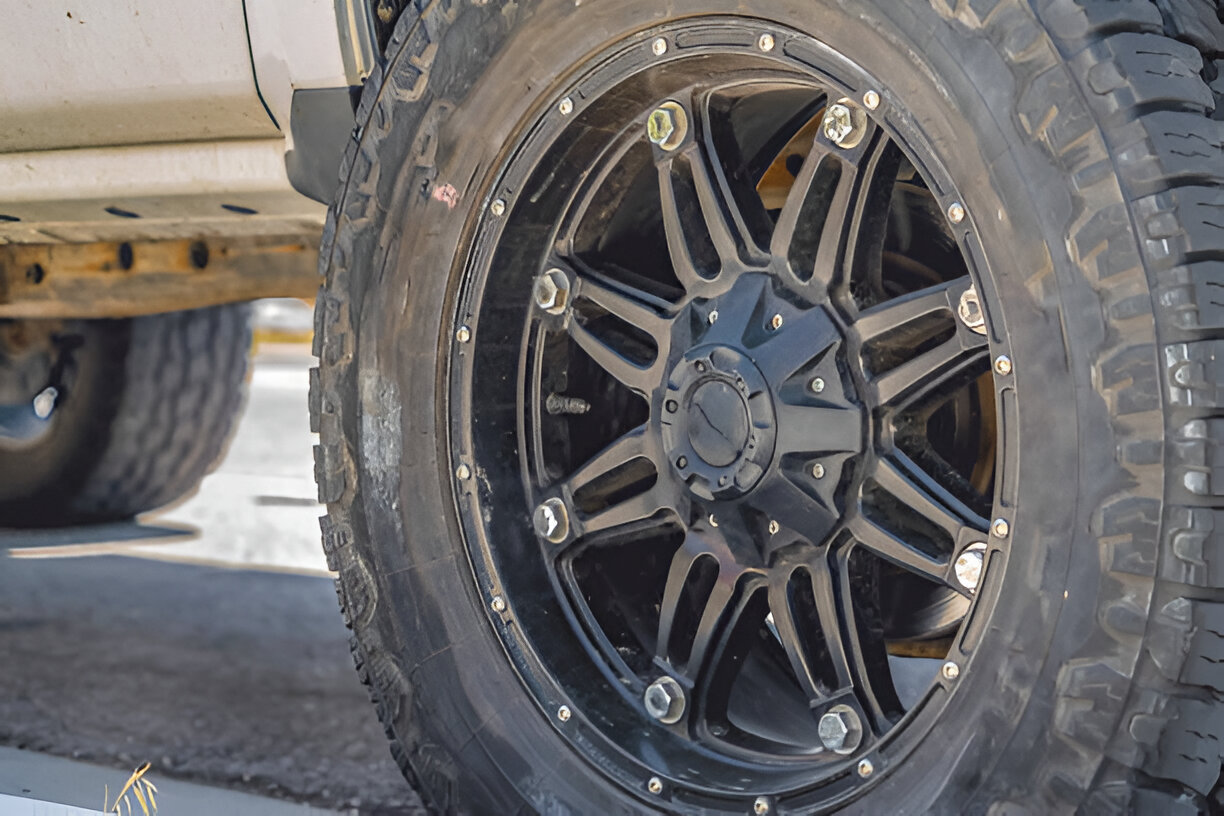Last Updated on September 9, 2024
Understanding How Wheel Balancing Can Improve Your Driving Experience
Is Your Car’s Vibration Due to Tires?
All kinds of things might vibrate your car, but the most common culprits are your tires or wheels. The good news is that tires and wheels are both easy to check and easy to fix or replace.
You’re not alone if you’ve ever experienced your car vibrating while driving. It’s a common issue that can be both annoying and concerning. However, the culprit behind this vibration might surprise you: your tires.
This comprehensive guide delves into the often-overlooked importance of wheel balancing and how unbalanced tires can lead to unsettling car vibration. We’ll explore wheel balancing, why it matters, and how it can improve your driving experience. Say goodbye to those nervous vibrations and hello to a smoother, safer ride.
Wheel balancing
Wheel balancing is equalizing the weight distribution of a tire and wheel assembly. It involves adding or removing weights to ensure the assembly’s weight is evenly distributed around the axle. This balancing act reduces vibrations, minimizes uneven tire wear, and enhances overall vehicle performance.
Importance Of Wheel balancing And Its Impact On Car Vibrations:
Indeed, here are some key points regarding the importance of wheel balancing and its impact on car vibrations:
- Vibration Mystery Solved: Car vibrations can often be attributed to unbalanced tires. When the weight distribution of a tire and wheel assembly is uneven, it can result in vibrations felt throughout the vehicle.
- What is Wheel Balancing? Wheel balancing ensures that the weight of the tire and wheel assembly is evenly distributed around the axle. This balancing act eliminates vibrations and promotes a smoother ride.
- Enhanced Comfort: Properly balanced wheels contribute to driving comfort by reducing vibrations, providing a more pleasant ride.
- Tire Lifespan: Wheel balancing extends the lifespan of your tires by promoting even tire wear. Uneven wear can lead to premature tire replacement, costing you more in the long run.
- Safety First: Balanced wheels improve vehicle stability and handling, enhancing safety on the road. Eliminating vibrations reduces the risk of accidents or loss of control while driving.
- Wheel Alignment Matters: Wheel alignment is crucial in addition to wheel balancing. It ensures that your tires and wheels align with your vehicle’s specifications, enhancing steering response, handling, and safety.
- Professional Inspection: If your car continues to shake even after wheel balancing, it may indicate other issues like worn suspension components or misaligned wheels. A professional inspection is essential to identify and address the root cause of the problem.
- Smooth, Safe Ride: By understanding the importance of wheel balancing, you can take steps to ensure a smoother, safer ride for yourself and your passengers.
Remember that addressing wheel balancing issues promptly improves your driving experience and safety on the road.
Reasons For Wheel Balancing
Indeed, here are six key reasons why wheel balancing is essential for your vehicle:
- Vibration Reduction: Wheel balancing eliminates vibrations in your car, providing a smoother and more comfortable driving experience. It ensures that your ride is accessible from the unsettling feeling of palpitations.
- Extended Tire Life: Proper wheel balancing promotes even tire wear, extending the lifespan of your tires and saving you money on premature replacements. Balanced tires wear more evenly, which means they last longer.
- Enhanced Safety: Balanced wheels contribute to better vehicle stability and handling. Reduced vibrations improve overall safety by minimizing the risk of accidents or loss of control while driving.
- Improved Fuel Efficiency: Balanced wheels reduce rolling resistance, improving fuel efficiency. When your tires are balanced, your car doesn’t have to work as hard to maintain speed, leading to potential fuel savings.
- Preventing Uneven Tire Wear: Wheel imbalance can cause uneven tire wear patterns. By addressing wheel balancing issues, you can prevent irregular tire wear and ensure that your tires perform optimally.
- Better Handling and Control: Properly balanced wheels enhance your vehicle’s steering response and control, making it easier to navigate corners and maintain stability, especially at higher speeds.
Remember, regular wheel balancing is a simple yet effective way to ensure your car rides smoothly, extend the life of your tires, and enhance your safety on the road.
Diagnosing Tire Problems
1) Wheel Balancing
Does your car begin to shake when it reaches 45 mph or more? If so, the chances are you need to take your vehicle to a tire professional to have your tires balanced.
Your tires are usually balanced when new, but that doesn’t guarantee they stay balanced as their tread wears down. Tires become lighter as they wear down and often don’t wear evenly. For that reason, they may need to be rebalanced.
If your tires were already recently balanced, check the rims to ensure one of the balance weights has not fallen off. If that has happened, you might be able to have your tires rebalanced for no charge.

2) Tread Separation
Does your car vibrate most strongly between 10 and 40 mph? Check for tread separation or ask a tire professional to examine it.
Tires separate when exposed to excessive heat, often because they have been run underinflated for an extended period. The tread begins actually to separate from the tire carcass.
You can check for this by jacking up your car and spinning the tires while watching the tread patterns. If the tread pattern gets wavy in places instead of completely straight, or if you see bulges, that indicates tread separation.
If Separation is the cause of your vehicle vibration, replace your tires immediately. Tread separation can be extremely dangerous when driving because it can result in a blowout.
3) Flat Spots
If your vehicle has been sitting in the same place for many days, especially when parked on hot asphalt with a heavy load, your tires are strong candidates for developing a flat spot. A flat area can occur at the bottom of your tires, where they press against the road. Generally, if you drive at a slow speed for a while, your tires will become round once again.
4) Bent Rim
You might have bent a rim by banging into a curb too hard or driving too fast into a road hazard, such as a pothole. It is often difficult to determine a bent rim by yourself. If your car is vibrating and there is no apparent connection to other tire issues, have your tire specialist check for a bent rim.
4) Other Causes of Vibration
It’s a good idea to check your tires first because, statistically, they are the most likely cause of vibration.
If your tires and wheels receive a clean bill of health from a tire shop, the next step might be a trip to your mechanic.
Your mechanic might find the vibration generated by your engine, poor alignment, or worn or damaged brakes. Beat might also come from a bent axle, driveshaft, or worn-out velocity joints at the end of the drive axles, to name some of the most likely causes after checking tires and wheels.
Conclusion
If you’ve been wondering why your car vibrates while driving, it might be time to consider wheel balancing. Don’t let tire vibration compromise your driving experience and safety. Address wheel balancing issues promptly to ensure a smoother, more comfortable ride.
Ready to experience a smoother, vibration-free ride? Explore our range of wheel balancing services and quality tires at Tires Easy (https://www.tires-easy.com/). Your comfort and safety matter to us. Drive with confidence; get your wheels balanced today!
FAQs
What are the benefits of wheel balancing in a car?
Wheel balancing offers several benefits for your car. First, it enhances driving comfort by reducing vibrations and ensuring a smoother ride. Second, it extends the lifespan of your tires by promoting even tire wear. Third, balanced wheels improve your vehicle’s handling and stability, enhancing safety on the road. Ultimately, wheel balancing contributes to a more enjoyable and safe driving experience.
Why is it important to balance the tire and wheel assembly?
Balancing the tire and wheel assembly is crucial for several reasons. First and foremost, it eliminates vibrations that can affect your driving comfort and safety. It also promotes even tire wear, extending the life of your tires and saving you money in the long run. Correctly balanced wheels contribute to better handling and stability, reducing the risk of accidents or loss of control while driving.
What are the benefits of a wheel alignment?
Wheel alignment ensures that your tires and wheels align correctly with your vehicle’s specifications. The benefits include improved steering response, better handling, and increased fuel efficiency. Proper alignment also extends tire life, reduces tire wear, and enhances safety by preventing irregular tire wear patterns.
Can wheel imbalance cause vibrations?
Yes, wheel imbalance is a common cause of vibrations in a car. When the weight distribution of a tire and wheel assembly is uneven, it can lead to vibrations that are felt throughout the vehicle, especially at higher speeds. Balancing the wheels can resolve this issue and restore a smoother ride.
Why does my car still shake when my tires are balanced?
If your car shakes after wheel balancing, it may indicate other issues, such as worn or damaged suspension components, misaligned wheels, or tire problems. It’s essential to have your vehicle thoroughly inspected by a professional to diagnose and address the root cause of the shaking.
What causes car wheel vibration?
Car wheel vibration can result from various factors, including wheel imbalance, misaligned wheels, worn or damaged suspension components, or tire issues. Identifying the specific cause of the vibration may require a professional inspection to ensure safe and effective repairs.
Can uneven tire wear cause vibration?
Yes, uneven tire wear can lead to vibrations in your car. When tires wear unevenly, irregularities in the tire’s surface create vibrations that are felt while driving. Proper wheel alignment and regular tire rotation can help prevent uneven tire wear and vibrations.
-
Writer









